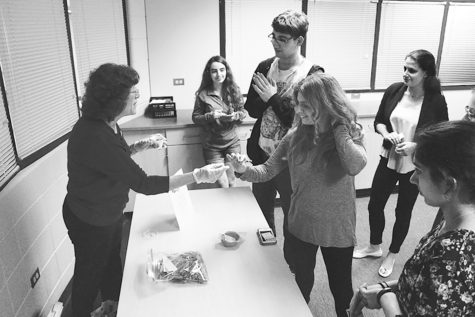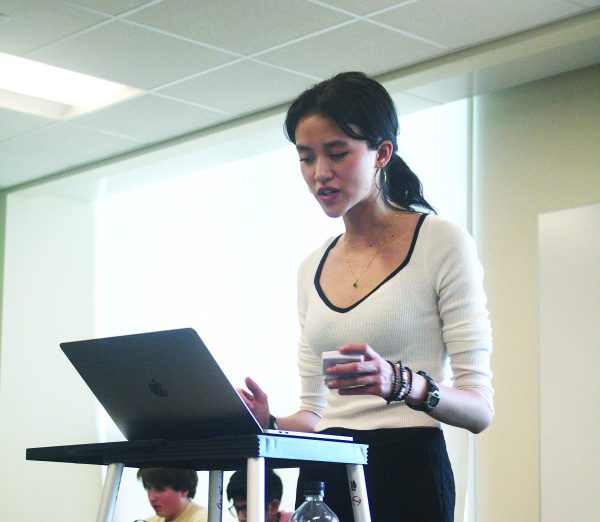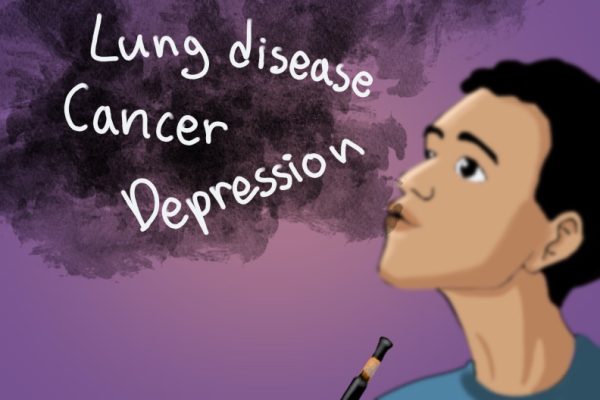‘Get Vegucated’ speaker brings attention to GMO pros, cons

While poring over the list of ingredients on the bag of potato chips in her hands, junior Pari Thakkar stared wide-eyed as she came across one genetically modified ingredient after another.
As president of the ‘Get Vegucated’ club, a healthy-eating club with a “vegetarian lens,” Thakkar helped organize the club’s Oct. 6 meeting where Robin Plotner-Sax, member of the Go Green Northbrook Board of Directors, presented her opinion on the harmful effects of genetically modified organisms (GMOs).
According to the World Health Organization, GMOs are created by transferring specific genes from one organism into another. Food producers genetically modify foods to add nutrients so that they are more beneficial to consumers and to help protect crops from diseases, insects and herbicides, prompting concern over the safety of GMO foods for humans.
At the meeting, Plotner-Sax also discussed how to recognize GMOs in the grocery store. To reveal how common genetically modified ingredients are, she handed out a list of commonly found ingredients that are produced using GMOs. Attendees read the ingredient labels of a variety of groceries and took note of the ones that were genetically modified.
“I was really very surprised to find so many GMOs in those groceries because they were foods that we [see] everyday at the grocery store, and we wouldn’t think twice about their genetically modified ingredients before placing them in our carts,” said Thakkar. “Before the presentation, I was aware that some foods I was eating were genetically modified, but it never occurred to me how widespread this problem was.”
As an advocate for GMO technologies, Ruth MacDonald, professor and chair of food science and human nutrition at Iowa State University, said genetic modification technology is a valuable tool that can combat agricultural concerns, such as climate and temperature change, which limit feeding an ever-growing population.
“Where we grow food and how we grow food is going to have to adapt, and [we need to use] all the tools necessary to [make that happen],” MacDonald said.
While addressing the reservations that some people have about the genetic modification of foods, MacDonald said the benefits of GMO technology can be “unlimited.”
“[GMO technology is] so powerful …, so we don’t want to put this technology in a basket and hide it because we have unrealistic fears about it,” MacDonald said.
She said the main sources of GMO ingredients in our foods come from genetically modified corn, soybeans, canola oil and sugar.
“There’s zero difference between corn oil that was grown from a genetically modified corn and one that was grown from an organic farm,” said MacDonald. “There’s no difference nutritionally, there’s no difference chemically, there’s no traces of any of the [transferred] protein or the DNA.”
However, not everyone believes that GMOs reap all of their intended benefits. Robert Schooler, student activist at Cornell University, started his own class at his school in opposition to the Cornell science department’s overwhelming support of genetic modification technology.
“There’s absolutely zero need for GMOs,” said Schooler. “To feed the world, to get higher yields, to do anything you want agriculturally, [there’s no need for] GMOs.”
Schooler said there are several published studies that discuss the harms of GMO foods on animals, but the risk that GMOs pose for people is still unknown.
“In 1996, GMOs were introduced on the market, but they weren’t labeled, and they’re still not labeled in America,” said Schooler. “That’s interesting because that means we cannot do any scientific studies on the human population. … We can’t ask people, ‘Are you eating GMOs?’ or, ‘Are you not eating GMOs?’ We don’t know because they’re unlabeled.”
In order to put the debate over GMOs to rest, Thakkar said the public needs to become more knowledgeable to develop their stance on the idea.
“Awareness is the first step in solving this problem,” Thakkar said.









